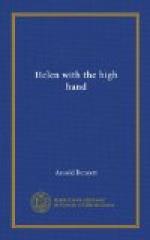Helen blushed and frowned, and looked up into the darkling heaven of her parasol; and then it occurred to her that her wisest plan would be to laugh. So she laughed. She laughed in almost precisely the same manner as James had heard Susan laugh thirty years previously, before love had come into Susan’s life like a shell into a fortress, and finally blown their fragile relations all to pieces. A few minutes earlier the sight of great-stepuncle James had filled Helen with sadness, and he had not suspected it. Now her laugh filled James with sadness, and she did not suspect it. In his sadness, however, he was glad that she laughed so naturally, and that the sombre magnificence of her dress and her gloves and parasol did not prevent her from opening her rather large mouth and showing her teeth.
“It was just like mother to tell me fibs about her age,” said Helen, generously (it is always interesting to observe the transformation of a lie into a fib). “And I shall write and tell her she’s a horrid mean thing. I shall write to her this very night.”
“So Susan’s gone and married again!” James murmured, reflectively.
Helen now definitely turned the whole of her mortal part towards James, so that she fronted him, and her feet were near his. He also turned, in response to this diplomatic advance, and leant his right elbow on the back of the seat, and his chin on his right palm. He put his left leg over his right leg, and thus his left foot swayed like a bird on a twig within an inch of Helen’s flounce. The parasol covered the faces of the just and the unjust impartially.
“I suppose you don’t know a farmer named Bratt that used to have a farm near Sneyd?” said Helen.
“I can’t say as I do,” said James.
“Well, that’s the man!” said Helen. “He used to come to Longshaw cattle-market with sheep and things.”
“Sheep and things!” echoed James. “What things?”
“Oh! I don’t know,” said Helen, sharply. “Sheep and things.”
“And what did your mother take to Longshaw cattle-market?” James inquired. “I understood as she let lodgings.”
“Not since I’ve been a teacher,” said Helen, rather more sharply. “Mother didn’t take anything to the cattle-market. But you know our house was just close to the cattle-market.”
“No, I didn’t,” said James, stoutly. “I thought as it was in Aynsley-street.”
“Oh! that’s years ago!” said Helen, shocked by his ignorance. “We’ve lived in Sneyd-road for years—years.”
“I’ll not deny it,” said James.
“The great fault of our house,” Helen proceeded, “was that mother daren’t stir out of it on cattle-market days.”
“Why not?”
“Cows!” said Helen. “Mother simply can’t look at a cow, and they were passing all the time.”
“She should ha’ been thankful as it wasn’t bulls,” James put in.
“But I mean bulls too!” exclaimed Helen. “In fact, it was a bull that led to it.”




